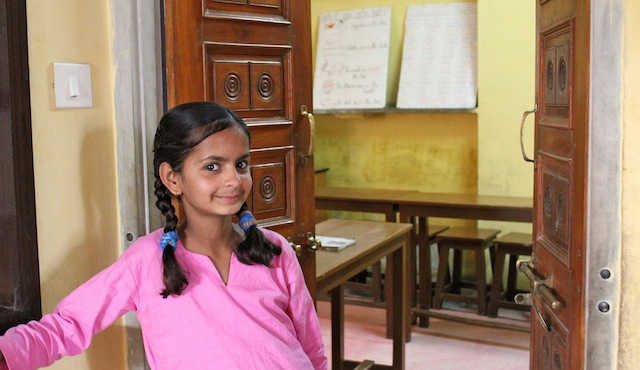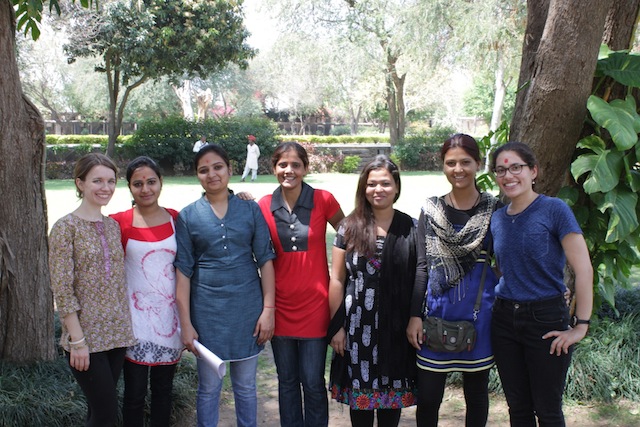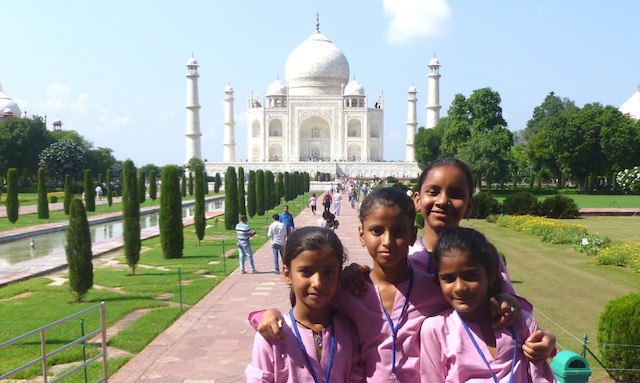
Mrs. Veena Rathore, director of Tushita and Kamalan Travels in Jaipur, also runs the Tushita Foundation, a trust intended to promote betterment in the living conditions of the less fortunate in India, channelizing the energies that can be produced through tourism. In the village of Amber (outside Jaipur, Rajasthan), the Tushita Foundation’s house of learning and empowerment plays host to a fruitful exchange between village children and highly educated Western students.
Q: How did you come up with the idea of the Foundation?
Having been so closely involved with various local communities in India for over three decades, from Leh to the Rann of Kutch and all the way to Rameswaram, we have realised how important it is for us to be a bridge between cultures. As Tushita grew, so grew in us the desire to contribute to the development of the community allowing for an exchange with foreign travellers. Knowing the codes and the customs of both India and the West, we knew we could help facilitate an enriching exchange between both Indian communities and foreign travellers.
Q: What was your motivation?
Working in Jaipur, which is one of the most important tourist hubs in India, we were often puzzled by the fact that some parts of the population didn’t benefit from it at all. In the village of Amber, laid at the footsteps of the famous fort, (which was recently added to the UNESCO world heritage list) the community did not benefit from this interaction and the children had no access to advanced English education.
We were motivated by a strong desire to share the benefits of responsible tourism with the population there and decided to open a house of learning and empowerment in the centre of the village.
Q: What did you intend to do?
We intended to be an agent of development, therefore we opened our doors to the children after school, wishing to help with one of the most important of their parents’ concerns, children’s education. In India, even the poorest man wants his child to study.
Q: How do you recruit your teachers?
The six teachers who work at the Foundation in the afternoon and receive English tutoring from the foreign volunteers in the morning, are young students from the village of Amber.
All of them have a passion for learning. They are working towards their Master’s degrees and are very thankful to the Foundation for the economic independence they have thus acquired.
All of them have a niece or a nephew among the students at the Foundation. Being young and open minded, they understand some of the unconventional methods of education we apply, like theatre and travel. Our children have already visited the Taj Mahal, discovered the painted havelis of Shekawat and dined at the Maharaja’s table at Samode Bagh.

Q: Why do you invite volunteers from the West and what do they do?
When Kamalan, a division of Tushita, was founded to cater to independent travellers in search of an intimate interaction with the Indian culture, we saw the opportunity for a fruitful exchange.
Convinced that travel is a fundamental and extremely enriching form of education, Tushita decided to invite freshly graduated students from the best Universities in the world to share their multidisciplinary education with village children who are normally exposed only to a very basic one. After a selection process, we invite three to four such bright minds with room, board, transportation and even yoga classes in the morning, in exchange of a three month involvement in the activities of the Tushita Foundation.
Each of them brings a project, based on a passion he/she wishes to share with the children:
Giunia from la Sorbonne read the French master piece “The Little Prince”, Anthony, from the Political Science Institute in Paris thought geography, Geetika from Harvard, focused on grammar and storytelling”…
All of them collaborate with the local teachers also on special projects like the fabulous play they coauthored: “The magic peacock and the four children”.
Q: After four years of activity where do you think you have been successful and where would you like to see improvement?
In the past four years, we have had the pleasure to see everyone involved with the Foundation grow, not only the children, something we had expected, but the teachers, the volunteers and ourselves, the founders of the Foundation, who humbly learn from experience how to contribute without imposing our views on the community.
Lately, we were able to acquire a piece of land in front of the house where the children can practice sports and dance, learn gardening and invite their parents to see their performances.
Before the summer holidays in April this year, we have had a lovely community reunion when the families gathered to see to their children’s art show. We shared tea and snacks and had a grand time witnessing the parents’ joy and pride.
Of course, there is always so much space for improvement, we would love to be able to accept every child that applies to join the Foundation, but right now, with 170 children, we are obliged to refuse and that is quite painful.
Q: How do you think you are making a difference in the village of Amber?
I hope, this does not sound too proud, but I must say that we make an obvious difference when we see the children come running every day to the Foundation, when we hear their joyful laughter, when we receive accolades from grateful parents.

Learn more about the Tushita Foundation here:
http://www.kamalan-travels.com/blog/unforgettable/
http://www.kamalan-travels.com/blog/among-the-rajputs/
http://www.kamalan-travels.com/blog/children-of-amber/
About the Writer:
Rosenda Meer has co-founded Kamalan, the Indian Travel Craftsman, hoping to connect with a special kind of traveller, one who is searching to apprehend India through Indian eyes and share the beauty we love. You can reach her at [email protected]



